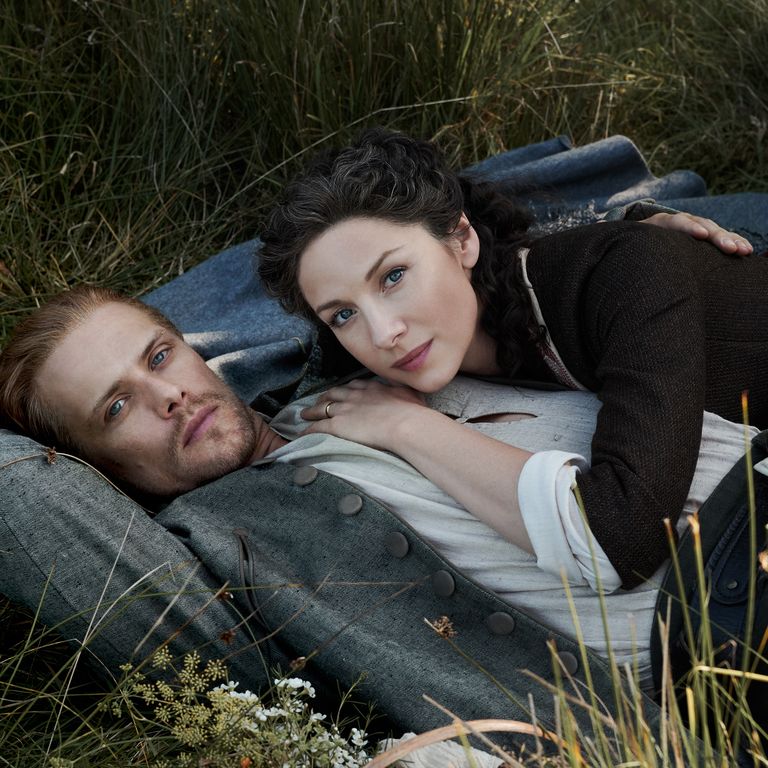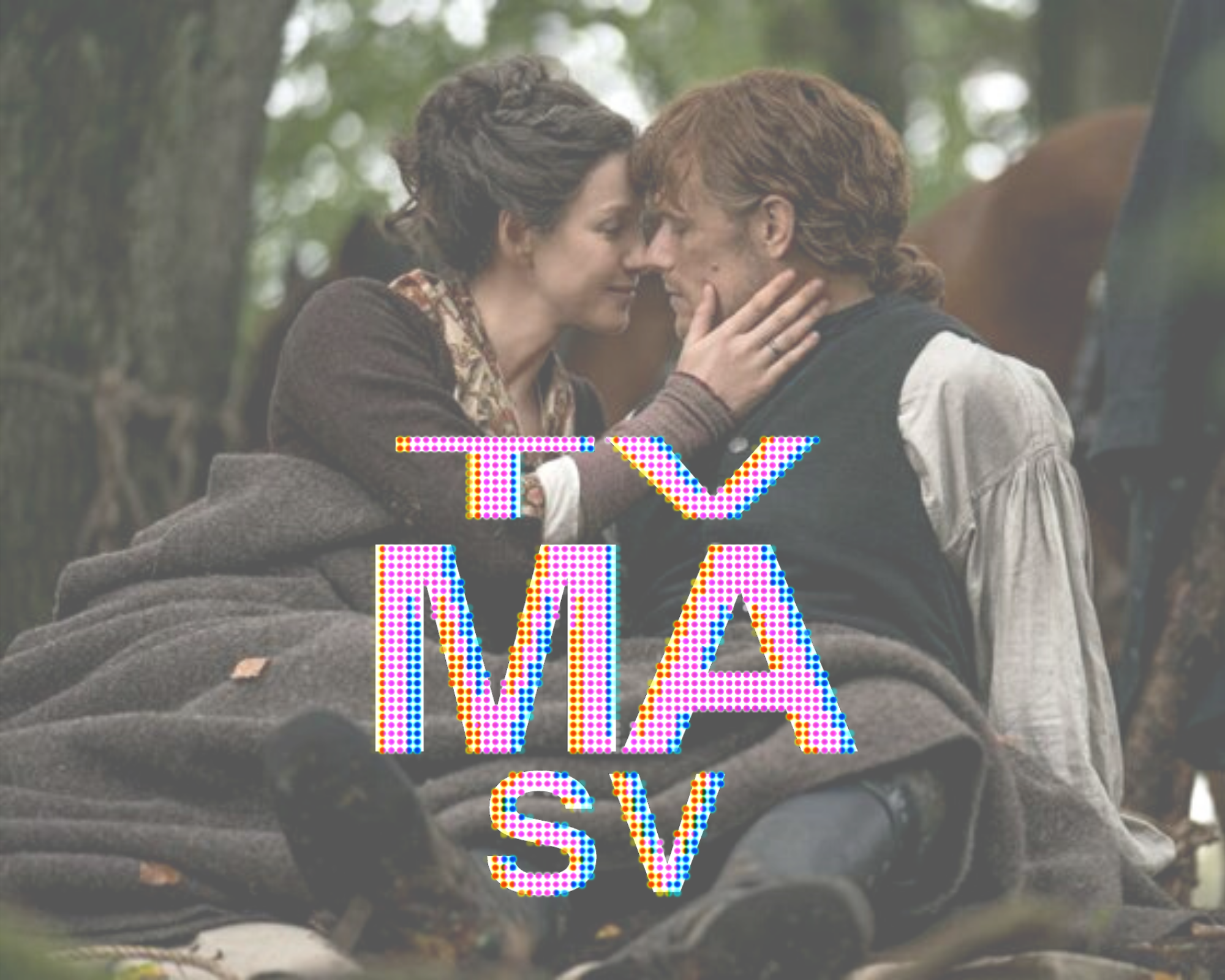The featured image courtesy of Starz. Illustration by Elisabeth Oster.
*contains spoilers for the first two seasons, TW for discussion of sexual assault and domestic abuse*
When I started watching the Starz series “Outlander” about a month ago, it seemed like the perfect distraction from my busy work and school life. Based on the series of novels by Diana Gabaldon, the show promised everything I could have wanted: fantasy, romance, adventure, a strong female lead, and a period drama with beautiful landscapes.
Although “Outlander” achieved all of these major points, and I was thoroughly enamored with the characters for a while, I started to notice a sickening pattern about halfway through the second season. The show’s representations of sexual assault and domestic violence were so problematic that I could no longer bring myself to continue watching.
The show follows Claire, an English combat nurse who has just returned home to her husband at the end of WWII. They travel together to Scotland for a much-needed retreat. While exploring the countryside, Claire accidentally travels back in time to 1743 when she comes into contact with an enchanted landmark. She meets Jamie, the member of a Highlander clan of the period, who takes it upon himself to protect her from the occupying British army. While trying to find a way back to her own time, she starts living with him at the clan’s fort. Of course, they fall in love in the process and Claire has to choose between two husbands, two lives, and two time periods.
At first, I was more than willing to give the show the benefit of the doubt. While I was annoyed that the 18th-century male characters consistently made misogynistic jokes and comments about their wives and practically every other woman, I figured that it was a norm associated with that time period. However, the violence quickly became more overt and overwhelming. In just two seasons, Claire was subjected to domestic abuse, countless unwanted advances, and sexually assaulted on three different occasions. Her husband, Jamie, and two minors were also raped.
That degree of violence was hard enough to justify watching. But, to make it worse, in only one of these cases did any discussion of trauma or recovery arise, and it was related to the husband’s experience.
One of the things that I did appreciate about this show is that the women were, indeed, strong female characters. Claire, among others, wasn’t afraid to speak her mind, to show the men that she knew what she was doing, and to run after what she wanted. Claire could move into a high-pressure medical situation without even a hint of uncertainty, but as a viewer, was I meant to understand that this strength also made her impervious to the trauma of sexual assault and abuse? Was I meant to understand that her husband’s experience was somehow more traumatic and invasive, because he was a man? It certainly felt that way, because the scenes in which Claire was subjected to violence were forgotten almost immediately after they happened. She acted angry and upset, and then no one ever brought it up again.
Narratives of sexual assault and violence like those depicted in the show—which made hardly any reference to the ensuing trauma and the sense of recovery that people struggle to regain— were undoubtedly very real for the time period. Historically documenting these narratives would be one thing, but I saw no justification for simply presenting them as drama in an entertainment medium today. The show treated these experiences merely as plot points, lacking in any believable display of the character’s interiority, and instead just continued forward to the next event. As a viewer, this insensitive representation made it impossible to enjoy the show.
But for readers (or viewers) also looking for a distraction, this story seems to assume a troubling willingness to turn a blind eye to the sexualization and romanticization of abuse against women.
Cassandra Bertolini
And this problem did not only arise with the TV adaptation. The first book in Gabaldon’s series, originally published in 2005 with the same title, still holds an overall 4.23 star rating on Goodreads. However, one of the first reviews that appears for this book is a one-star rating from Deborah with the facetious subtitle “here’s a list of all the things I learned about rape from Outlander.” She outlines similar, problematic scenes in the novel, several referencing marital rape, as do many of the other low star reviews. The higher star ratings almost exclusively gush about the romance which, at its heart, is what this book aims to provide. But for readers (or viewers) also looking for a distraction, this story seems to assume a troubling willingness to turn a blind eye to the sexualization and romanticization of abuse against women.
Of course, these are just characters and not real people—these things didn’t actually happen to them. However, there is a real issue in displaying characters experiencing abuse, both physical and emotional, in ways that make today’s viewers connect those elements to the idea of a desirable relationship. Viewers and readers want Claire to stay in the 1700s with her new husband because he is beautiful, passionate, and adventurous, rather than return to her more stable life. It makes viewers and readers think that they want some version of that as well.

Claire’s refusal to leave and constant forgiveness of Jamie’s actions excuses that abuse and makes it appear unproblematic, when it truly is. The show’s tendency to overlook the emotional repercussions of both abuse and assault is extremely alienating for any viewers who have in fact been a victim of sexual assault, know someone who was a victim, or can empathize with a victim. The series became less of an escape into romance and fantasy, and more of a reminder of our current reality.
The newest installment of “Outlander,” Season 5, premieres this Sunday, Feb. 16 on Starz. But before you binge the latest season or start trying to catch up, it’s important to remember that we should always be critical of our entertainment and the media we consume. Yes, this show promises a world to get lost in, with unique characters and an interesting premise, but no matter how much we as viewers long for an escape, we have to start holding ourselves accountable for these stigmas related to abuse and assault that our entertainment perpetuates. Even though I’d become invested in the characters and 18th century setting of “Outlander,” I realized that there is no reason for assault and abuse to be used as plot devices today in the 21st century.
So, I’m waiting for a fantasy romance show that doesn’t make my stomach twist with unease every other episode. I’m waiting for a show that acknowledges the trauma and recovery related to assault, so that all viewers realize those experiences are not somehow parts of a romantic plot. I’m waiting for a show that makes a healthy relationship the desirable focus. Most of all, I’m waiting for a show that doesn’t degrade its strong female characters or repress their experiences, but rather validates their emotions as an extension of that perceived strength.

